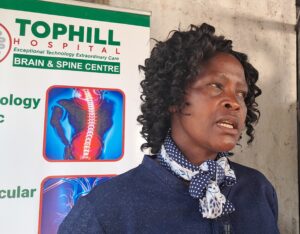Pregnant Women Urged to Attend Antenatal Care to Avert Preterm Births

The County Executive Committee Member for Health and Sanitation Ruth Koech has urged expectant mothers to attend antenatal care and undergo thorough medical check-up to prevent premature births.
Speaking at Meteitei Sub County Hospital in Soba/Songhor Ward, Tinderet Sub County the CEC Member said expectant mothers should attend antenatal care at least four times before delivery as required of them.
“Mothers who attend antenatal care late miss the opportunity of early detection of diseases, health education and treatment or prevention of complications,” she said.
“It has been reported that most women in the county seldom present for antenatal care very late,” she noted.
The County Reproductive Health Coordinator Irine Berenge said that medical check-up done during antenatal care enables medical workers identify mothers who are at risk of premature labour. Interventions in form of medication against risk factors like hypertension, fevers and sexually transmitted infections, are done to prevent preterm labour.
She said such risk factors if not attended to negatively impact on the pregnancy and the health of both the baby and the mother.
Berenge also encouraged mothers to use family planning services to space child birth and reduce maternal deaths. “Use of family planning services helps a mother’s body to recover and build up a reserve ready for the next baby,” Berenge said.
Many health problems in pregnant women can be prevented, detected and treated by trained health workers across all the health facilities in the county during antenatal care visits. The World Health Organization (WHO) recommends a minimum of four antenatal visits, comprising interventions such as tetanus toxoid vaccination, screening and treatment for infections, and identification of warning signs during pregnancy. The main objectives of antenatal care are: prevention and treatment of any complications; emergency preparedness; birth planning; satisfying any unmet nutritional, social, emotional and physical needs of pregnant woman; provision of patient education, including successful care and nutrition of the newborn; identification of high risk pregnancy; encouragement of (male) partner involvement in antenatal care.








